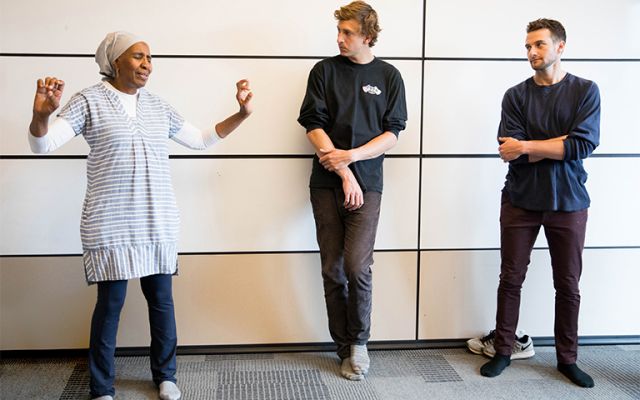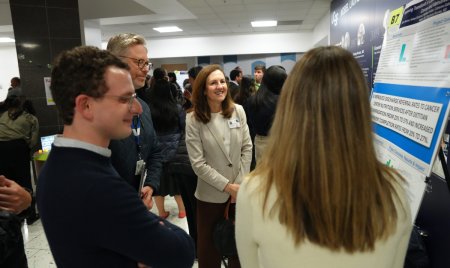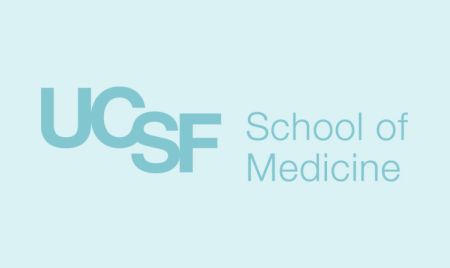Answering the Call: Educators Drive Initiatives to Address Wellness at UCSF

Academy member Carol Miller, MD, professor of Pediatrics, and director of Pediatric Primary Care and the Well Baby Nursery, demonstrates a Tai Chi movement for first-year medical students Bennett Kissel, center, and Michael Dodge as part of the wellness classes offered through the ARCH program, held in the Teaching and Learning Center, on the Parnassus campus.
Posted in CFE News on October, 2, 2017
With 40-60% of practicing physicians reporting burnout nationwide, health professions educators at UCSF are answering the call from our local constituencies and national organizations to make provider well being a central theme in our work. Numerous initiatives exist, aimed at better understanding and addressing the causes of burnout and promoting well being and resiliency in all members of our campus community, from students to faculty. For example, Dr. Lee Jones, associate dean for students and DoQuyen Tran-Taylor, director of the student experience, and colleagues are making well being a central thread in the UCSF School of Medicine curriculum, and Dr. Diane Sliwka is promoting physician engagement, communication, and recognition for faculty at UCSF Health.
Beth Harleman, MD
Associate Chair for Faculty Experience for the Department of Medicine and Associate Program Director at ZSFG hospital
There are mandated changes in graduate medical education that have been driving innovation as well.
- In March 2017, the Accreditation Council for Graduate Medical Education issued revised Common Program Requirements, including new, specific expectations for residency and fellowship programs to address well being of residents, fellows, and teaching faculty. Several UCSF residency programs have developed innovative responses to this call that are advancing the local and national dialogue on improving trainee well being.
- The Department of Pediatrics has convened a task force on resident well being, under the leadership of Associate Program Director for Mentoring and Professional Development Dr. Meg McNamara. The response to the call for task force members was "tremendous - over 30 people responded right away with their desire to join this effort," Dr. McNamara reports. The task force will investigate national efforts to promote wellness in residency training and develop interventions to target both individual skill building as well as structural changes. As educators, Dr. McNamara says it’s imperative that "we incorporate well-being in a very deliberate way into our educational structures. We need to acknowledge that well being is an integral part of our mission as a profession. The staggering levels of depression and burnout can’t be ignored anymore."
Sometimes the most authentic well-being interventions come from trainees themselves.
- Dr. Travis-Riley Korenaga, a resident in UCSF’s Obstetrics, Gynecology and Reproductive Sciences Residency Program, took action after he and other resident colleagues experienced well-being challenges in training. Dr. Korenaga reflects, "wellness in training is things that fill your cup. For some that’s being active, for others that’s watching TV or reading a book, but always it’s about replenishing yourself. Time for reflection is critical - time to sit and think about things that happened recently or even years ago." Dr. Korenaga and his residency classmates realized that, while they deeply valued the support they could offer each other as friends and colleagues, they also needed professionally facilitated opportunities to reflect and restore. Dr. Korenaga brought these concerns to program director Dr. Meg Autry, who took action by creating protected time for first and second year resident classes to discuss the challenges of training with a professional facilitator.
- Dr. Carter Lebares, faculty in the Department of Surgery, has been intrigued by the power of mindfulness meditation to enhance resilience to stressful situations for decades. Dr. Lebares defines resilience as, “the phenotype of responding to stress differently. We recognize resilience in particular people who thrive under adversity and meet challenges in a unique way. While people have valued that capability, we have all struggled with how to teach resilience rather than just admiring it in others.” For Dr. Lebares, this work includes teaching mindfulness as a way to “heal from the stressful interactions we have as physicians and help our minds work as cleanly as possible, so that we can solve complex problems”, including the problem of well-being in training years. Dr. Lebares is currently conducting a randomized trial of teaching mindfulness meditation to surgical interns as well as an intervention for senior urology residents; both aimed at teaching residents the skills of mindfulness based stress reduction and assessing its feasibility and impact on a number of behavioral and cognitive domains.
Supporting the development of personal resilience and addressing structural challenges to well being in GME are complementary strategies.
- Dr. Larissa Thomas, Interim Associate Program Director for Inpatient Affairs and Director of Resident Well-Being for the Internal Medicine Residency Program notes that changing the structure of training is critical to supporting well-being. Changing structures requires "out of the box" thinking. In collaboration with a physician graduate of the Stanford Design School, Dr. Thomas organized a volunteer group of resident physicians who used design thinking techniques to better understand resident needs and develop creative solutions to enhance well being. The Residency Families project was one result of their work. This resident-run, near-peer community gives residents an opportunity to both engage in social activities and receive support and coaching to address the challenges of residency. Family "captains" receive special training in facilitation techniques, self-compassion and coaching. "Larissa plans to turn her attention next to addressing some of the long-held structural expectations of residency training that can negatively impact well-being, such as lack of control over scheduling and lack of flexibility to achieve work-life integration in residency." She says, "these barriers to resident well-being may seem intractable, but they are more movable than we think."









